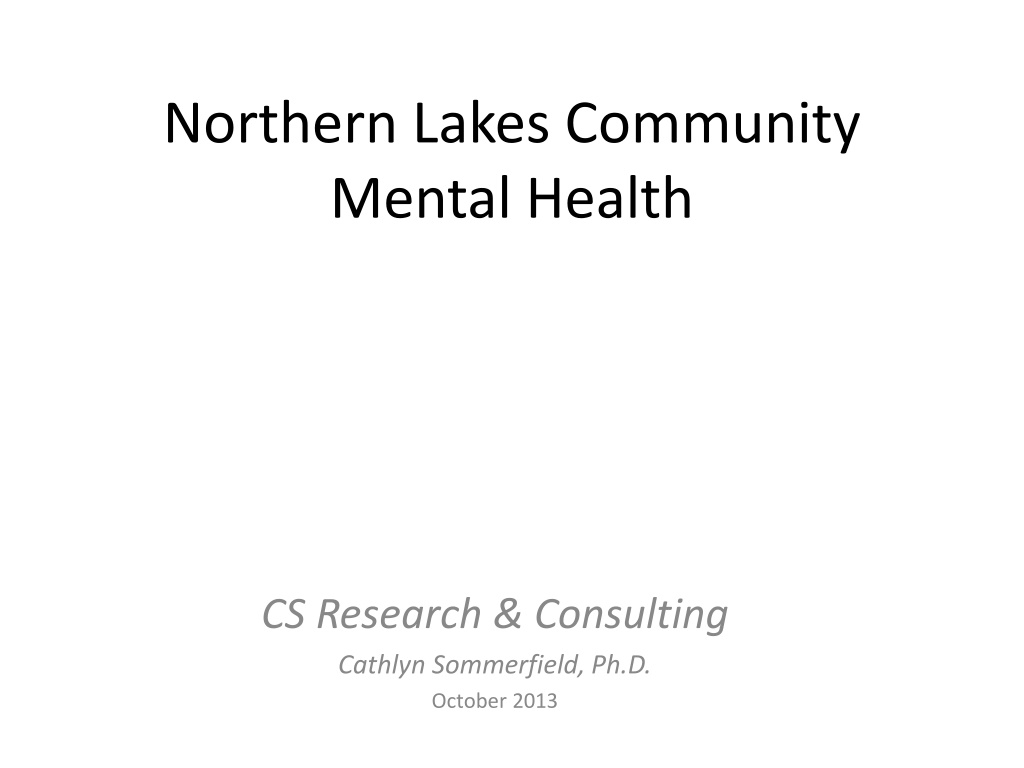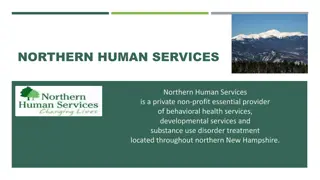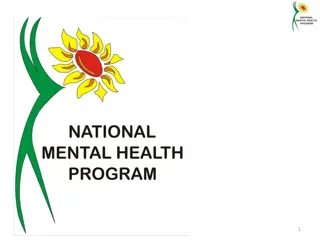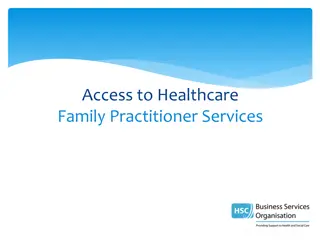Northern Lakes Community Mental Health Research Findings
The research conducted by Northern Lakes Community Mental Health focused on assessing community attitudes and awareness levels regarding mental health and disability issues. The methodology involved a telephone survey of residents aged 18 and over in specific counties. Results indicated insights into information-seeking behaviors, personal connections to mental health treatment, and awareness levels of the organization. Various statistical analyses were employed to interpret the data collected from 2006 to 2013, highlighting trends and changes over time.
Download Presentation

Please find below an Image/Link to download the presentation.
The content on the website is provided AS IS for your information and personal use only. It may not be sold, licensed, or shared on other websites without obtaining consent from the author.If you encounter any issues during the download, it is possible that the publisher has removed the file from their server.
You are allowed to download the files provided on this website for personal or commercial use, subject to the condition that they are used lawfully. All files are the property of their respective owners.
The content on the website is provided AS IS for your information and personal use only. It may not be sold, licensed, or shared on other websites without obtaining consent from the author.
E N D
Presentation Transcript
Northern Lakes Community Mental Health CS Research & Consulting Cathlyn Sommerfield, Ph.D. October 2013
Research Objective The purpose of the research is to assess attitudes and awareness levels of community members concerning mental health and disability issues.
Methodology Telephone survey conducted with a random sample of residents, 18 years of age and over, within Northern Lake s service area, which includes Crawford, Roscommon, Wexford, Missaukee, Grand Traverse and Leelanau counties. Sample size determined by applying the area s 18-and-over population to a sampling table for 95% confidence level. The sample consisted of 1:4 wireless versus land line records. The sample was screened during survey administration to more closely align with age distribution as represented in current census data. A total of 385 surveys was completed for a 95% confidence level and +/- 5% confidence interval. Survey data was analyzed using SPSS for Windows. Analyses include frequencies, cross- tabulations and chi-square analyses, which measure significant interactions between variables. In addition, 2013 and 2010 data files were merged to assess significant variation by year. The final report also includes data collected in 2006/2008 pre and post tests for comparative purposes.
Question 1: Where would you look first if you or a family member needed information on a mental health issue? 2006 Survey % (count) 36.1% (137) 2008 Survey % (count) 36.1% (140) 2010 Survey % (count) 31.3% (124) 2013 Survey % (count) 35.8% (138) Doctor/Nurse 4.2% (16) 4.6% (18) 4.3% (17) 2.3% (9) Friend/Relative 1.6% (6) 1.5% (6) 1.5% (6) 1.8% (7) Private Counselor/Therapist Social Worker/Student Assistant Worker 1.6% (6) 0.5% (2) 0.8% (3) 2.3% (9) 9.5% (36) 7.2% (28) 6.3% (25) 6.2% (24) Yellow Pages 14.2% (54) 14.9% (58) 19.9% (79) 16.4% (63) Internet 1.3% (5) 0.5% (2) 0.3% (1) .3% (1) Library 0.5% (2) 1.3% (5) 1.0% (4) .8% (3) Mercy Hospital Northern Lakes Community Mental Health 12.9% (49) 10.6% (41) 13.6% (54) 16.6% (64) Munson Medical Center 6.6% (25) 8.2% (32) 5.6% (22) 2.6% (10) Other (DK =25; Pastor/Church = 11) 11.6% (44) 14.7% (56) 15.4% (61) 14.8% (57) -Statistically significant by Gender
Question 2: Do you personally know anyone who has received treatment for a mental illness or developmental disability?* 60% Question 2: Do you personally know anyone who has received treatment for a mental illness or developmental disability? 51% 48% 50% 2006 Survey % (count) 2008 Survey % (count) 2010 Survey % (count) 2013 Survey % (count) 40% 30% Yes 56.1% (215) 52.8% (205) 51.8 % (205) 47.8% (184) 20% No 42.8% (164) 45.6% (177) 47.2% (187) 50.6% (195) 10% 2% Uncertain 1.0% (4) 1.5% (6) 1.0% (4) 1.6% (6) 0% Yes No Uncertain *Association variable
Question 3: How aware are you of Northern Lakes Community Mental Health? 70% 65% Question 3: How aware are you of Northern Lakes Community Mental Health? 60% 2006 Survey % (count) 2008 Survey % (count) 2010 Survey % (count) 2013 Survey % (count) 50% 40% Very Aware 9.6% (37) 10.3% (40) 10.4% (41) 14.8% (57) 30% 20% 20% Somewhat Aware 16.1% (62) 16.2% (63) 20.2% (80) 20.3% (78) 15% 10% Not at all Aware 74.3% (286) 73.5% (285) 69.4% (275) 64.9% (250) 0% Very Aware Somewhat Aware Not At All Aware -Statistically significant by Association
Question 4: In your opinion, how would your community rate the quality of service at Northern Lakes Community Mental Health?* Question 4: In your opinion, how would your community rate the quality of service at Northern Lakes Community Mental Health?* 50% 43% 45% 40% 2013 Survey % (count) 2006 Survey % (count) 2008 Survey % (count) 2010 Survey % (count) 35% 28% 30% 27% Excellent 19.4% (13) 24.2% (15) 26.7% (23) 25% 15.0% (9) 20% Above Average 40.3% (27) 36.7% (22) 29.0% (18) 27.9% (24) 15% Average 29.9% (20) 41.7% (25) 40.3% (25) 43.0% (37) 10% 5% Below Average 3.0% (2) 3.3% (2) 4.8% (3) 2.3% (2) 0% Poor 7.5% (5) 3.3% (2) 1.6% (1) 0.0% (0) Excellent Above Average Average Below Average Poor *Asked only of those indicating Very or Somewhat Aware of NLCMH; 49 respondents indicated DK
Question 5a: Treating people with a mental illness or developmental disability in their own community, instead of in an institution, is good. Question 5a: Treating people with a mental illness or developmental disability in their own community, instead of in an institution, is good. 2006 Survey % (count) 2008 Survey % (count) 2010 Survey % (count) 2013 Survey % (count) Strongly Agree 66.7% (254) 68.7% (265) 64.2% (253) 59.2% (225) Somewhat Agree 23.4% (89) 22.8% (88) 25.9% (102) 27.1% (103) Undecided 6.0% (23) 5.7% (22) 7.9% (31) 8.9% (34) Somewhat Disagree 2.9% (11) 2.1% (8) 1.3% (5) 2.4% (9) Strongly Disagree 1.0% (4) 0.8% (3) 0.8% (3) 2.4% (9)
Question 5b: Health insurance plans should be required to provide equal coverage for people with mental illness and for those with physical illness. Question 5b: Health insurance plans should be required to provide equal coverage for people with mental illness and for those with physical illness. 2006 Survey % (count) 2008 Survey % (count) 2010 Survey % (count) 2013 Survey % (count) 74.7% (287) 78.0% (302) 72.6% (286) 72.5% (274) Strongly Agree 19.3% (74) 15.0% (58) 17.5% (69) 18.0% (68) Somewhat Agree 2.9% (11) 3.9% (15) 5.1% (20) 6.9% (26) Undecided 0.8% (3) 2.3% (9) 3.0% (12) 1.6% (6) Somewhat Disagree 2.3% (9) 0.8% (3) 1.8% (7) 1.1% (4) Strongly Disagree -Statistically significant by Association
Question 5c: Treatment can help people with mental illness lead normal lives. (Prior to 2010, question read: Medical and psychological treatments can help people with mental illness.) Question 5c: Treatment can help people with mental illness lead normal lives. (Prior to 2010, question read: Medical and psychological treatments can help people with mental illness.) 2006 Survey % (count) 72.6% (276) 2008 Survey % (count) 73.4% (282) 2010 National Data 2010 State Data 2010 Survey % (count) 2013 Survey % (count) Strongly Agree 66.0% (256) 52.8% (198) 62.8% 65.9% Somewhat Agree 20.5% (78) 20.8% (80) 29.1% (113) 34.9% (131) 25.8% 25.2% Undecided 5.8% (22) 5.2% (20) 3.4% (13) 8.0% (30) 2.1% .9% Somewhat Disagree 0.8% (3) 0.5% (2) 1.5% (6) 3.7% (14) 3.9% 3.5% Strongly Disagree 0.3% (1) 0.0% (0) 0.0% (0) .5% (2) 1.8% 1.6% -Statistically significant by Year
Question 5d: People are generally caring and sympathetic to people with mental illness. Question 5d: People are generally caring and sympathetic to people with mental illness. 2010 National Data 2010 State Data 2010 Survey % (count) 2013 Survey % (count) Strongly Agree 12.5% (49) 11.3% (43) 22.3% 22.9% Somewhat Agree 42.1% (165) 33.6% (128) 35.0% 37.3% Undecided 8.9% (35) 14.4% (55) 3.2% 1.5% Somewhat Disagree 28.1% (110) 31.2% (119) 24.7% 26.0% Strongly Disagree 8.4% (33) 9.4% (36) 10.6% 10.0% -Statistically significant by Year
Question 5e: If I knew a child who was experiencing a mental health crisis, I would know who to call for assistance. Question 5e: If I knew a child who was experiencing a mental health crisis, I would know who to call for assistance. 2006 Survey % (count) 2008 Survey % (count) 2010 Survey % (count) 2013 Survey % (count) Strongly Agree - 37.0% (133) 32.0% (123) 31.9% (120) Somewhat Agree - 28.7% (103) 30.5% (117) 26.1% (98) Undecided - 13.4% (48) 11.2% (43) 14.1% (53) Somewhat Disagree - 11.7% (42) 13.0% (50) 17.3% (65) Strongly Disagree - 9.2% (33) 13.3% (51) 10.6% (40) -Statistically significant by Association
Question 5f: Children with a serious emotional disturbance can be helped with treatment. Question 5f: Children with a serious emotional disturbance can be helped with treatment. 2006 Survey % (count) 2008 Survey % (count) 2010 Survey % (count) 2013 Survey % (count) Strongly Agree - 75.4% (291) 60.7% (238) 52.9% (200) Somewhat Agree - 20.2% (78) 31.6% (124) 36.2% (137) Undecided - 4.1% (16) 6.1% (24) 9.0% (34) Somewhat Disagree - 0.3% (1) 1.0% (4) 1.9% (7) Strongly Disagree - 0.0% (0) 0.5% (2) 0.0% (0) -Statistically significant by Association, Gender

























